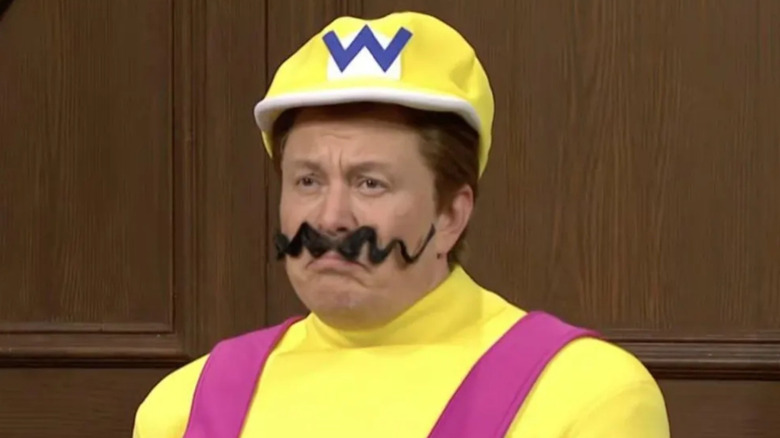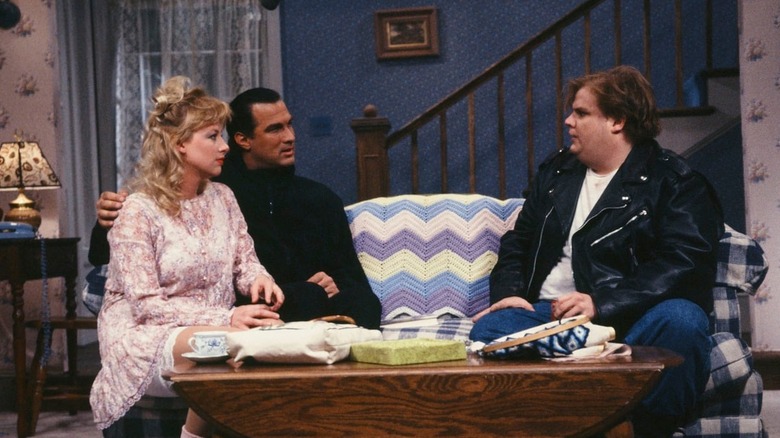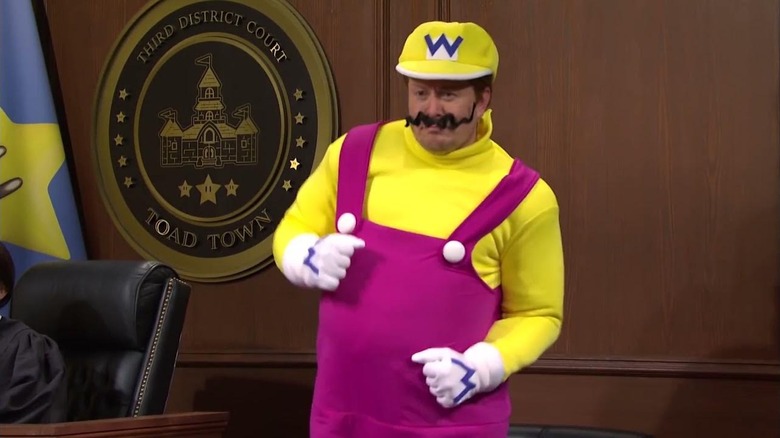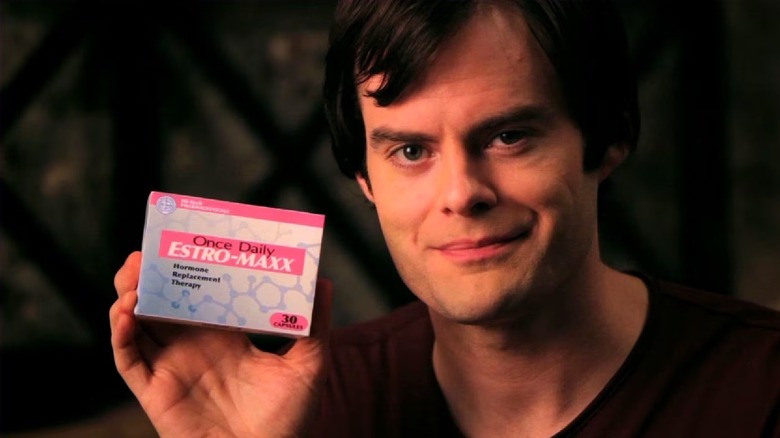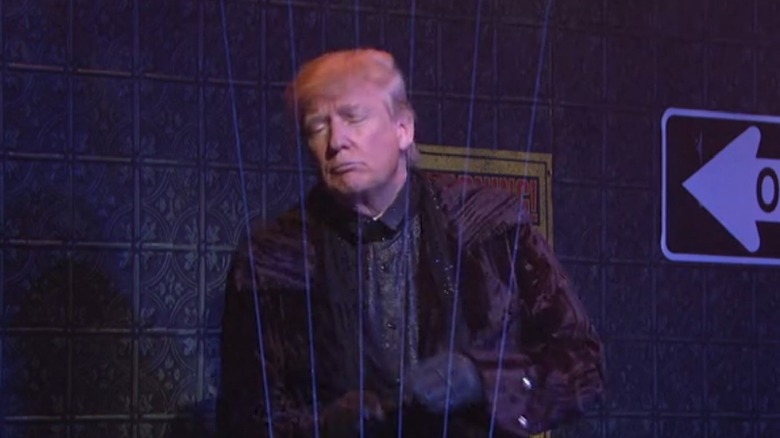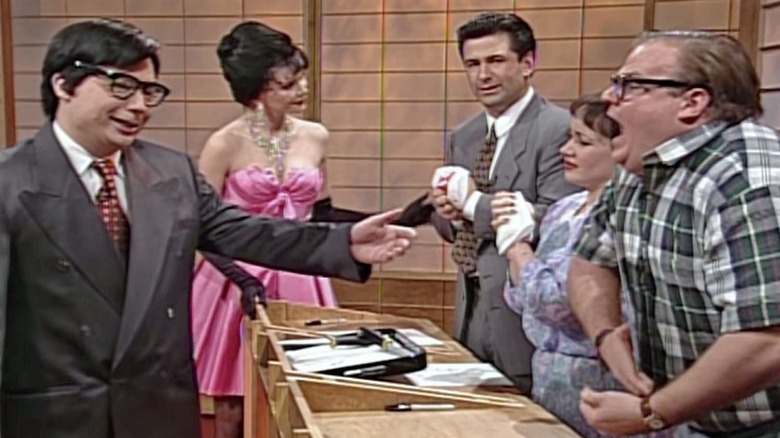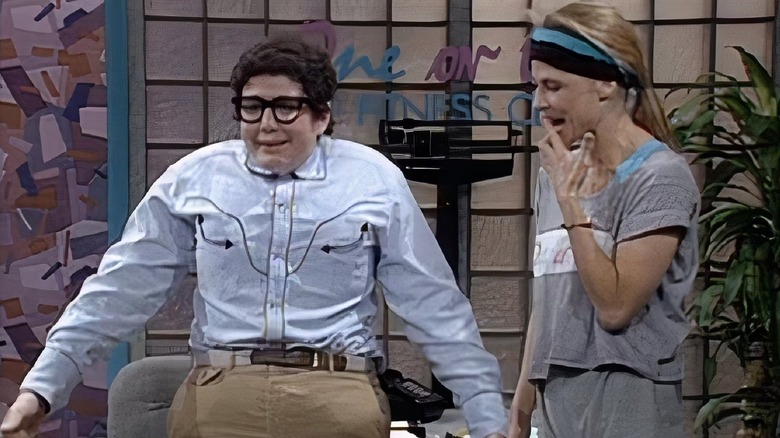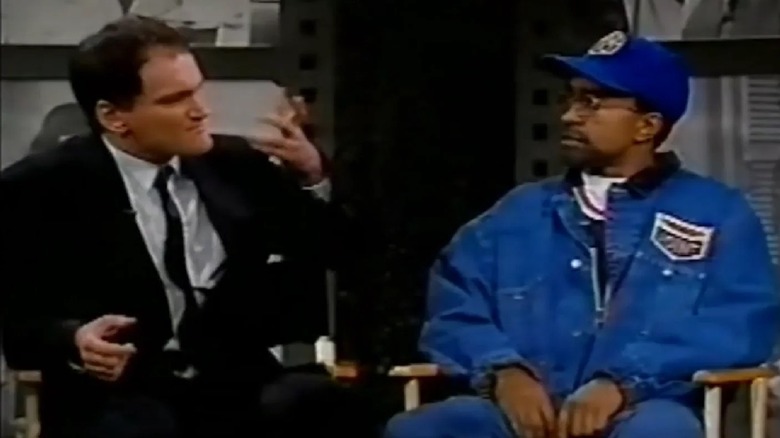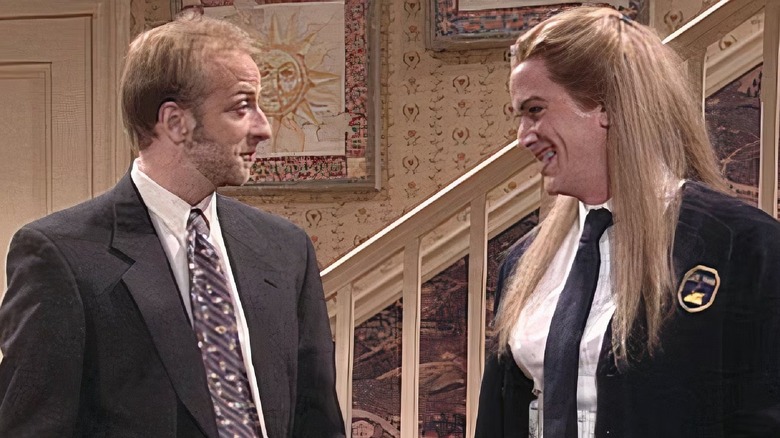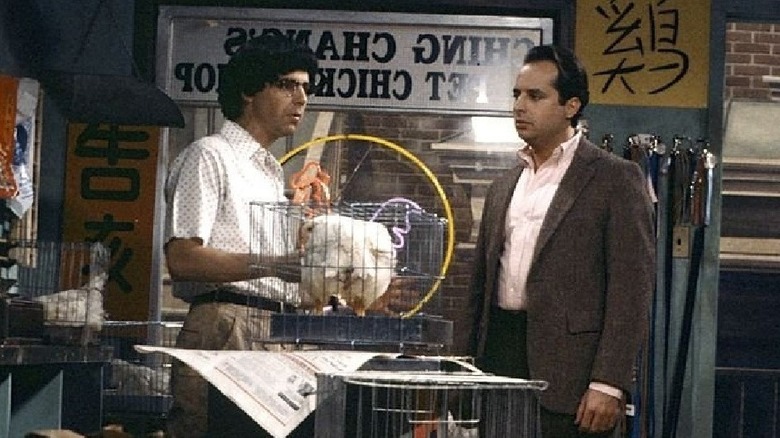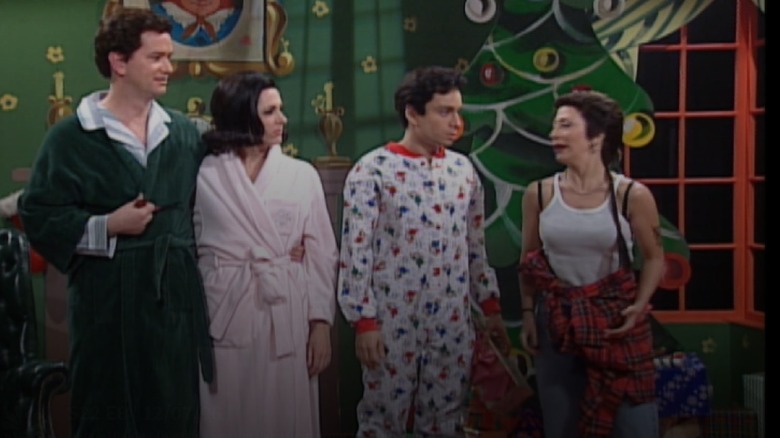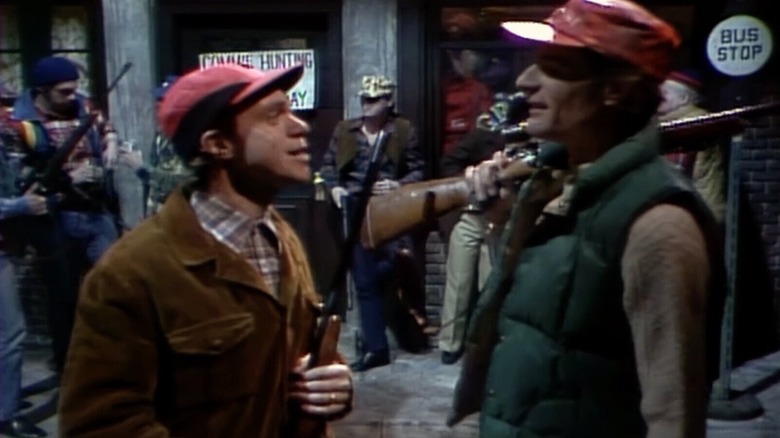The 11 Cringiest SNL Sketches Of All-Time
Every "Saturday Night Live" episode has clunker sketches. 90 minutes of live televised comedy will inevitably produce some segments that miss the mark or just come off as strained. Considering the show's 50 years of pop culture longevity, there's a whole treasure trove of misfired sketches beyond just the episodes anchored by the worst guest hosts in "Saturday Night Live" history. Even considering that stark truth, however, there are some truly egregious, cringe-inducing sketches scattered throughout the history of "Saturday Night Live" on NBC.
These aren't just unfunny or uncomfortable sketches. They're a few minutes of comedy that feel like they stretch on for eternity. The only way to endure such monstrosities is to hang on and pray it will all be over soon. Every "Saturday Night Live" season, from the worst to the best, has these kinds of sketches, but a number of specific ones over the last 50 years stand out as the most cringe-inducing. Some were due to a terrible host who had no business anchoring a comedy program. while others are the result of instantly outdated and uncomfortable material. Still others fell prey to recurring comedic approaches to gender or sexuality that plague the writing of "SNL" to this very day.
This show has had countless high points in its lenghty existence, including all the laughs crafted by the best first-time hosts of "Saturday Night Live." On the other hand, these 11 nadirs in cringe-inducing comedy reflect the lowest of the steep valleys that "Saturday Night Live" can sometimes find itself in.
Jennifer's Date
Many cringe-inducing "Saturday Night Live" sketches inspire unintended shudders thanks to outdated material or shoddy treatment of marginalized voices. One particular 1991 sketch, though, earns the term "cringy" thanks to the acting by that night's host. Known to be a nightmare on the set of his movies, Steven Seagal aded to his abrasive, tainted legacy by becoming one of the most infamous "SNL" hosts in history. For proof of just how bad Seagal was at this gig, just watch (or don't) "Jennifer's Date." Witnessing this trainwreck of a sketch, it's staggering to consider how much this man bungles even simple lines like "I won't get a call in the middle of the night saying your car broke down, will I?" or "I'd be here, waiting."
Seagal barrels through words and delivers key lines with nary any sense of variation, depriving the sketch of any necessary comedic escalation. The simple concept of a dad intimidating the "bad boy" (here played by Chris Farley) taking his daughter out for the evening stretches out for eternity. Seagal just drains all energy from the screen, even when he flashes a chest tattoo. Veteran live performers like Farley look adrift playing against him. When the nearly six-minute segment ends, viewers will undoubtedly exhale a grateful breath that this embarrassing material has concluded. Now just imagine having to watch another 80 or so minutes of sketches like this during the rest of Seagal's hosting stint.
Wario
A good tip for "Saturday Night Live" viewers is that if the show is hosted by somebody who isn't an on-air personality of any kind, chances are the episode is going down the tubes fast. Case in point: the 2021 installment hosted by Elon Musk. This whole episode was a comedic nightmare, but a courtroom sketch entitled "Wario," in which Musk plays Wario standing trial for the murder of Mario, was especially egregious. For starters, too much of the sketch just restates pieces of Mario lore rather than coming up with inspired comedic subversions of the video game franchise. Name-dropping Waluigi or "rainbow road" does not function as a substitute for comedy.
Musk's performance is also absolutely dreadful during the entire fiasco as he strains mightily to inhabit an uber-arch personality reminiscent of Wario's video game aura. As if all that weren't baffling enough, the sketch ends with an awkward stab at relevancy by having Pete Davidson show up at the end as Andrew Cuomo, who claims that he, like Wario, is a "misunderstood Italian American." Musk's "Wario" sketch goes all over the place, but it never lands somewhere remotely funny. In its final execution, it feels like the kind of college freshman improv sketch that inspires people to cover their eyes in embarrassment. The fact that this aired live on NBC in front of millions of people is astonishing in all the wrong ways, but this is what happens when non-performers anchor "Saturday Night Live."
Once Daily Esto-Maxx
Trans women are often the punchline of mainstream comedy and "Saturday Night Live" has dabbled in countless sketches cruelly mocking this community. Among the more atrocious modern examples of this phenomenon is a 2011 sketch entitled "Once Daily Esto-Maxx." Played like a medication commercial (complete with people talking to the viewer about how a certain medicine helped them), this sketch features a number of cis-het male "Saturday Night Live" cast members as trans women extolling the virtues of Once Daily Esto-Maxx and how it helped them rapidly achieve their gender goals. The entire sketch focuses on "man in dress=funny" gags or cis-het male actors talking about "gigantic nipples."
It's all incredibly pedantic punchlines that toxic comedies like "Ace Ventura" have already exploited countless times before. There's simply no specificity or empathy in how talented performers like Bill Hader or Bobby Moynihan portray these trans women to mitigate the sketch's innate ickiness. There's also no shortage of medication commercial parodies on "SNL" and this segment's form and visual elements don't help "Once Daily Esto-Maxx" stand out from its brethren.
Even at the time of its release, "Once Daily Esto-Maxx" garnered criticism from LGBTQIA+ organizations for allegations of indulging in transphobic material. The years have not been kind to this sketch, which just hammers one joke into the ground over and over again. This humor certainly isn't unique just to "Once Daily Esto-Maxx," but this sketch is an especially egregious example of it.
Rock Band
"Rock Band" was a weird concept for a sketch from the start. To make this conceit sizzle, it desperately needed some masterfully absurdist Tim Robinson or Andy Samberg energy. This segment concerns a rock band (hence the title) that features a dejected member who feels under-served in the group simply because he's stuck playing the laser harp. Unfortunately for any writers that had high hopes for this sketch, all of its potential is utterly devastated by the laser harp player being host Donald Trump. Much like Elon Musk, Trump is no master of live performances or comedic acting. During this live segment, Trump struggles to nail down his lines, properly bounce off his co-stars, or even execute one comedic punchline. It's all so awkward and not in a fun way.
It's also not a visually stimulating sketch, with Trump isolated from the other "Saturday Night Live" cast members in front of a black wall for much of the segment. Even when lines get flubbed, there's nothing on-screen you can concentrate on instead to give yourself some fleeting entertainment. Even the costumes of the other band members are rudimentary. Everything in "Rock Band" lacks pizazz, and Trump's performance is just the most obvious example of this shortcoming. This 2015 "SNL" episode infamously gave Trump only 12 minutes of screentime. Given his embarrassing and cringe-inducing work in "Rock Band," it's not hard to see why they kept him off-screen whenever possible.
Japanese Game Show
Putting Mike Myers and Chris Farley into a "Saturday Night Live" sketch should be a recipe for instant comedic success. The infamous "Japanese Game Show" sketch, though, proved that not even this duo could lift up an innately broken concept for "comedy." This particular sketch skewers the perceived dangerousness of Japanese game shows, with Myers playing an eager host dishing out vicious violent punishments to an American contestant played by Farley.
Already the sight of Myers and other "Saturday Night Live" actors (plus Alec Baldwin!) in yellowface speaking in the most stereotypical pastiches of Japanese accents is already a total drag. Unfortunately, the sketch is entirely reliant on generic observations on how "wacky" Japanese culture is. But the broad physical torment Farley experiences here doesn't have much personality compared to the countless other sketches where he's put through the wringer.
This ensures his antics in "Japanese Game Show" remain derivative of better "SNL" material while robbing this particular sketch of any chance of feeling like it's providing any specific commentary. Also, most of the sketch's intended humor is derived from white "Saturday Night Live" performers channeling Mickey Rooney as Mr. Yunioshi in "Breakfast at Tiffany's." That repellant notion is a recipe for cringe rather than belly laughs. Myers and Farley had countless high points in their "Saturday Night Live" careers. Their "Japanese Game Show" antics were decidedly not among them.
Anything with It's Pat
Every recurring "Saturday Night Live" character, no matter how revered they may be, has some clunkers in their vast number of appearances. Not every "Wayne's World" or "MacGruber" segment could become a winner that's still quoted to this day. It's impressive, though, to see a recurring "SNL" character that really yielded no laughs in its lengthy existence. So it is with Pat, a Julia Sweeney character from the earlier '90s that had one joke: nobody could tell if Pat was a man or a woman. These sketches would waste the time of talented celebrity hosts like John Goodman or Catherine O'Hara by having them play people perplexed by just what was going on with Pat's gender identity.
These sketches are constantly told from the perspective of new characters gawking at Pat (rather than Pat themselves) immediately made it clear that Pat is a laughingstock, something to be mocked more than anything else. Sketches like "It's Pat: Pat Goes to the Gym" even leaned on cis people's obsession with which bathroom trans folks use, as characters played by Linda Hamilton and Tim Meadows scramble to see whether Pat goes to the men's or ladies' room. All these mean-spirited gags have left a troubling pop culture legacy, particularly for non-binary folks. Given how ill-conceived the entire idea of "It's Pat" was, it's impossible to pick just one as the cringiest ever. They all deserve that recognition.
Directors on Directing
When anyone turns on "Saturday Night Live," there's only one thing they want to see: Quentin Tarantino excitedly talking about his sexual exploits with the actresses he's directed. Just kidding: that's something no sane human being wants to see, hear, or think about. Yet that's just what happened with the 1995 sketch "Directors On Directing," which occurred the night Tarantino himself (fresh off the smash hit "Pulp Fiction") was hosting the show. The sketch, which is more moronic than any dumb thing in an actual Tarantino movie, saw Tarantino playing himself, accompanied by Tim Meadows as Spike Lee, David Koechner as Oliver Stone, and Mark McKinney as Gus Van Sant. A panel about "filmmaking" quickly goes sideways as Tarantino accuses all of his fellow directors of sleeping with their lead performers.
The segment ends with Tarantino (in response to a question about whether he had sex with Uma Thurman on the set of "Fiction") frantically shouting, "I jammed every chick on that set! And if you guys ever cast me in one of your movies, I'll jam every chick on your set!" As anyone exposed to Tarantino's on-screen acting knows, a little bit of this man goes a long way. Letting him take this segment's lead role was a massive mistake. Tarantino doesn't register as humorously brash, just irritating. Plus, the entire sketch's nonchalant attitude towards directors exerting sexual power over their employees is unnerving. This nightmare of a segment was like every Tarantino hater's worst nightmare.
Melanie Babysits
Like the MySpace sketch a little over a decade later, "Melanie Babysits" has one joke and one joke only: older men preying on teenage girls. Here, it's Chris Elliot as Dr. Henderson ogling and eventually raping Mark McKinney's Melanie that's the entire crux of the sketch. The segment already gets off on a toxic foot by making jokes about Henderson's wife's weight and how "repulsive" she is. This establishes a disturbing undercurrent to the sketch, where audiences are not only viewing the world through Dr. Henderson's eyes but are supposed to empathize with it. From there, Dr. Henderson drives babysitter Melanie home, but not before tricking her into guzzling excessive quantities of Zima and then molesting her.
This is the kind of material that even pitch-black comedy masters like John Waters or Todd Solondz would struggle to make work in their avant-garde movies. Within the confines of an NBC sketch comedy show, "Melanie Babysits" is utterly repulsive. The whole icky proceedings conclude with an incarcerated Dr. Henderson shouting from behind bars, "I'd do it again! I swear to the Lord above, given the chance, I would do it again!! Do you hear me, society??! I'd do it again!! And again! And again!" Where are the attempts at jokes here? This ill-conceived and disturbing sequence hinges entirely on thinking sexually predatory behavior is funny, especially when it happens to a man dressed up as a teenage girl. You'll need a shower after watching the incessantly putrid "Melanie Babysits."
Ching Chang In Love
Dana Carvey's "Saturday Night Live" career included countless recurring characters, one of which was, alas, Ching Chang, an Asian-American man obsessed with his chickens and Broadway. The entire gag of this character simply revolved around Carvey in yellowface doing a very caricatured accent and regurgitating harmful stereotypes about Asian-American men. The character showed up a whopping three times between January and May 1987 alone (out of seven total appearences), including the horrendous "Ching Chang in Love" sketch with guest host Valerie Bertinelli. All The Ching Chang sketches were deplorable, but this one, centering on the character's romantic pursuits, is especially hideous since it dabbles in widespread mockery of the idea of Asian-American men being sexually active or attractive.
While Carvey lent irresistible charm and specific details to characters like The Church Lady or Garth, his Ching Chang is a nightmare to behold, especially in "Ching Chang in Love." Any of Bertinelli's talents aren't enough to salvage a sketch with such a sickening starting concept, not to mention only one uncomfortable joke to fall back on. Even though "Ching Chang in Love" was arguably the nadir of this recurring character's existence, it was far from his last time on "Saturday Night Live." Ching Chang even returned to the program as late as the year 2000. If you thought "The Master of Disguise" was the most embarrassing thing Carvey ever did as a performer, just get a load of "Ching Chang in Love."
Happy Holiday Tales: Mickey the Dyke Comes Out for Christmas
In December 1996, Cheri Oteri's Mickey the Dyke character appeared on a Yuletide-themed "SNL" sketch entitled "Happy Holiday Tales: Mickey the Dyke Comes Out For Christmas." Will Ferrell reads from a storybook about Mickey returning on her motorcycle to her family home for Christmas. Her parents and sibling all think she's straight (despite Mickey dressing and acting like a stereotypical butch lesbian) and she eventually comes clean about her identity with a little help from Santa and a puppet rat in leather bondage gear. The whole sketch, as reflected in the quiet response of the live studio audience, is inherently a bit uncomfortable, especially with so many cis-het people throwing the word "dyke" around in a light-hearted fashion.
A rudimentary bit of "haha, gay people=funny" humor from "Saturday Night Live" dovetails into a hideous conclusion where Ferrell's narrator notes that Mickey eventually found acceptance by all "even though we all know it would just take a real man to turn her around." This repulsive closing line is a yawn-worthy old retread of toxic lies that queer women are "going through a phase" when they're attracted to women. This capper isn't just cringe-worthy in its handling of queerness, it's also just so rote. There were infinitely more interesting transgressive endings for "Happy Holiday Tales." Instead, this sketch cemented its cringeworthy nature with such well-worn material.
Commie Hunting Season
Throw a rock at any average list of the worst "SNL" sketches in history and you're bound to hit one that ranks "Commie Hunting Season" high. A deeply misguided attempt to create a sketch responding to the then-fresh Greensboro Massacre, this sketch finds Greensboro, North Carolina's governor — played by guest host Malcolm McDowell — giving some guidelines to rednecks who are hankering to shoot communists. This grim, three-minute boondoggle aired live on television with nary a laugh from the studio audience, leaning almost entirely on really arch Southern accents and a distressing number of instances of white "Saturday Night Live" cast members saying the N-word aloud.
Witnessing "Commie Hunting Season" four decades after it originally aired, it's especially disorienting how few (if any) stabs at jokes exist within this sketch. The vaguest comedic outline of juxtaposing rudimentary meeting procedures with white supremacist ambitions doesn't translate at all in the sketch, which just comes off as tedious in its dialogue and pacing. Viewers just get to watch hideous people hoist guns around, talk about "legality," and spew slurs without any cathartic or hysterical punchline to mitigate the nastiness.
Even a final beat in which one member of the hate group accidentally kills McDowell's governor goes nowhere, with "Commie Hunting Season" ending on a whimper. Sometimes, horrific reality can inspire great comedy. Dark material can be an effective bedrock for thoughtful humorous creations. "Commie Hunting Season" was not one of these instances.
If you or anyone you know has been a victim of sexual assault, or has experienced a hate crime, contact the relevant resources below:
-
Visit the Rape, Abuse & Incest National Network website or contact RAINN's National Helpline at 1-800-656-HOPE (4673).
-
Contact the VictimConnect Hotline by phone at 1-855-4-VICTIM or by chat for more information or assistance in locating services to help. If you or a loved one are in immediate danger, call 911.
